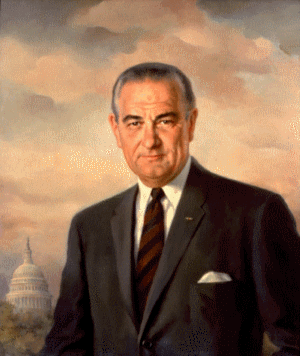| An Overview of Lyndon Johnson's Administration Lyndon
Johnson succeeded to the presidency upon the
assassination of President John F.
Kennedy, and was subsequently elected to a full term
in 1964.
As President, Johnson first had to comfort a nation
wracked by the untimely death of President Kennedy. He
then turned his attention to the urgent domestic problems
facing the nation. He was highly successful in getting
Congress to approve many of the social programs Kennedy
had proposed, as well as many of his own proposals. Among
his most notable achievements in domestic policy involved
significant improvements in civil rights. Johnson's skill
in congressional politics was not enough to overcome the
problems raised by the Vietnam War, however. With the
nation deeply divided over that war, Johnson surprised
everyone when, on March 31, 1968, he announced that he
would not be a candidate for another term.

| Election
of 1964 |
| Place of Nominating
Convention |
Atlantic City, NJ |
| Ballot on which
Nominated |
1st |
| Republican Opponent |
Barry M. Goldwater |
| Electoral Vote |
486 (Johnson) to 52 (Goldwater) |
| Popular Vote |
42,995,259 (Johnson) to
27,204,571 (Goldwater) |
| Age at Inauguration |
56 |
| |
|
| His
Vice-President and Cabinet |
| Vice-President |
Hubert
H. Humphrey (1965) |
| Secretary of State |
Dean Rusk |
| Secretary of the
Treasury |
C. Douglas Dillon
Henry H. Fowler (1965) |
| Secretary of Defense |
Robert S. McNamara
Clark
Clifford (1968) |
| Attorney General |
Robert F.
Kennedy
Nicholas Katzenbach (1965)
Ramsey
Clark (1967) |
| Postmaster General |
John A. Gronouski
Lawrence F. O'Brien (1965)
W. Marvin Watson (1968) |
| Secretary of the
Interior |
Stewart L. Udall |
| Secretary of Agriculture |
Orville
L. Freeman |
| Secretary of Commerce |
Luther H. Hodges
John T. Connor (1965)
Alexander B. Trowbridge (1967)
Cyrus R. Smith (1968) |
| Secretary of Labor |
W. Willard Wirtz |
| Secretary of Health,
Education and Welfare |
Anthony J. Celebrezze
John W. Gardner (1965) |
| Secretary of Housing and
Urban Development |
Robert C. Weaver (1966) |
| Secretary of
Transportation |
Alan S. Boyd (1967) |
| |
|
| Major
Domestic Events of His Administration |
| Population
in 1969: ~205,000,000 |
| November 22, 1963 |
President John F. Kennedy was
shot and fatally wounded while riding through
Dallas, Texas. |
| 1964 |
The 24th Amendment to the
Constitution outlawed poll taxes in national
elections. |
| April 1964 |
Union railroad workers staged a
strike which soon became known as "The
Railroad Crisis." |
| July 2, 1964 |
Congress passed, and Johnson
signed, a voting rights law. |
| 1965 |
The Elementary and Secondary
Education Act offered the first major federal aid
to elementary and secondary schools. |
| March 23, 1965 |
Astronauts Virgil Grissom and
John Young made the first Project
Gemini manned flight. |
| August 11-16, 1965 |
The Watts section of Los Angeles
erupted in racially motivated riots. |
| September 9, 1965 |
The Department of Housing and
Urban Development was established. |
| 1966 |
Robert C. Weaver became the
first black Cabinet member when he was appointed
Secretary of Housing and Urban Development. |
| July 1, 1966 |
Medicare went into effect. |
| October 15, 1966 |
The Department
of Transportation was established. |
| 1967 |
Riots broke out in Chicago,
Cleveland, Detroit,
Los Angeles, New York City, and Newark. |
| January 27, 1967 |
Three
astronauts died when their Apollo space capsule
caught fire during a launch pad test at Cape
Canaveral. |
| 1967 |
Thurgood Marshall became the
first black to serve on the U.S. Supreme Court. |
| 1967 |
The 25th Amendment spelled out
procedures for succession to the presidency and
vice-presidency in the event of disability or
death. |
| 1968 |
Congress passed the Civil Rights
Act, outlawing racial discrimination in the sale
or rental of houses and apartments. |
| April 4, 1968 |
Civil rights leader Martin
Luther King, Jr., was assassinated in Memphis,
Tennessee. |
| June 5, 1968 |
Senator and presidential
candidate Robert F. Kennedy was assassinated. |
| |
|
| Major
World Events of His Administration |
| 1964 |
Anti-U.S. riots broke out in the
Panama Canal Zone. |
| 1964 |
China exploded its first atomic
bomb. |
| August 1964 |
North Vietnam torpedo boats
attacked U.S. Navy destroyers in the Gulf of
Tonkin. |
| 1965 |
U.S. troops were sent to help
put down a rebellion in the Dominican Republic. |
| 1965 |
Sir
Winston Churchill, former Prime Minister of
Great Britain, died. |
| 1965 |
The United States first used
combat troops in the Vietnam War. |
| 1965 |
The Early Bird
satellite was launched by the United States. |
| 1965 |
Two United States
spacecraft--Gemini 6 and 7--achieved the first
space rendezvous. |
| 1966 |
France withdrew its armed forces
from the North
Atlantic Treaty Organization. |
| 1966 |
The United Nations General
Assembly approved a treaty banning the use of
nuclear and other mass-destruction weapons in
outer space. |
| 1967 |
The first successful human heart
transplant was performed by a surgical team
headed by Christiaan Barnard of South Africa. |
| 1968 |
The United Nations General
Assembly passed a treaty to halt the spread of
nuclear weapons. |
See Also
President John F. Kennedy
Clark Clifford
Robert F. Kennedy
Ramsey
Clark
Stewart L. Udall
Orville
L. Freeman
Project
Gemini
Department
of Transportation
Detroit
Riot, 1967
Apollo 1 Tragedy
Sir
Winston Churchill
North
Atlantic Treaty Organization
Questions
or comments about this page?
|
